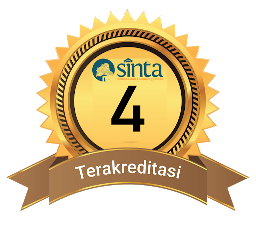The Validity of Blended Learning Oriented Student Worksheets to Improve Science Process Skills in Electrolyte and Non-Electrolyte Solution Materials
DOI:
10.29303/cep.v4i2.2394Published:
2021-08-14Issue:
Vol. 4 No. 2 (2021): Edisi Khusus Penelitian Pengembangan dalam rangka ulang tahun CEP yang ke 4Articles
Downloads
How to Cite
Abstract
This study aims to determine the validity of student worksheet with blended learning orientation to improve KPS in electrolyte and non-electrolyte solution material. The method used is Research and Development. Data collection was obtained from three validators in the field of chemistry education using validation sheets. The data obtained were analyzed descriptively quantitatively. This study discusses the validity of the developed LKPD, in terms of content and in terms of constructs. The results based on the validation assessment by the validator obtained very valid results on the content validity and construct validity with the respective percentages of 81.90% and 85.64%. It is concluded that student worksheet oriented blended learning to improve KPS in electrolyte and non-electrolyte solution material is valid as a learning medium.References
Ayd, A., & Education, S. (2013). Representation of Science Process Skills in The Chemisstry. International Journal of Education and Practice, 51-63.
Ayona, V., & Hidayah, R. (2020). Validitas Permainan Chemistry Adventure Berbasis Android Sebagai Media Pembelajaran Ikatan Kimia. UNESA Journal of Chemical Education, 245-252.
Champlain, D. (2010). A Primer On Classical Test Theory And Item Response Theory For Assessments In Medical Education. Medical Education.
Fitriyani, R., Haryani, S., & Susatyo, E. B. (2017). Pengaruh Model Inkuiri Terbimbing Terhadap Keterampilan Proses Sains Pada Materi Kelarutan dan Hasil Kali Kelarutan. Jurnal Inovasi Pendidikan Kimia, 1957-1970.
Harefa, A. O. (2013). Penerapan Teori Pembelajaran Ausubel Dalam Pembelajaran. Majalah Ilmiah Warta Dharmawangsa Edisi 36.
Kurniasih, I., & Sani, B. (2014). Implementasi Isi Buku Teks Bahasa Indonesia Berbasis Kurikulum 2013. JURNAL Suluh Pendidikan FKIP-UHN, 77-87.
Kurniawati, E. (2009). Pengembangan Bahan Ajar Bahasa dan Sastra Indonesia dengan Pendekatan Tematis. Tesis.
Kurniawati, E. D. (2009). Pengembangan Bahan Ajar Bahasa dan Sastra Indonesia dengan Pendekatan Tematis. Tesis.
Munandar, A. (2018). Pengantar Kurikulum. Yogyakarta: Deepublish.
Murniati, D., & Sanjaya, I. G. (2013). Pengembangan Perangkat Pembelajaran Kimia Berbasis Blended Learning di SMA Negeri 7 Kediri. UNESA Journal of Chemical Education, 133-137.
Muslich, M. (2010). Test Book Writing. Yogyakarta: Ar-Ruzz Media.
Nasional, D. P. (2008). Panduan Pengembangan Bahan Ajar. Jakarta: Departemen Pendidikan Nasional Direktorat Jendral Manajemen Pendidikan Dasar dan Menengah Direktorat Pembinaan Sekolah Menengah Atas.
Nur, M. (2011). Modul Keterampilan-keterampilan Proses Sains. Surabaya: Universitas Negeri Surabaya Pusat Sains dan Matematika Sekolah.
Prastowo, A. (2015). Panduan Kreatif Membuat Bahan Ajar Inovatif. Yogyakarta: DIVA Press.
Riduwan. (2016). Skala Pengukuran Variabel-variabel Penelitian. Bandung: Alfabet.
Risamasu, P. V. (2016). Peran Pendekatan Keterampilan Proses Sains Dalam Pembelajaran IPA. Prosiding Seminar Nasional Pendidikan (pp. 73-81). Jayapura: Universitas Cenderawasih.
Rohaeti, T. (2009). Perbandingan Model Pembelajaran Kontekstual dengan Model Pembelajaran Kooperatif dengan Pendekatan Think Pair Share Terhadap Hasil Belajar Siswa pada Mata Diklat Menganalisis Rangkaian Listrik dan Elektronika di SMK Negeri 12 Bandung. Skripsi.
Rustaman, N. (2007). Strategi Pembelajaran Biologi. Universitas Terbuka.
Semiawan, C., A.F, T., S, B., Y, M., & Suseloardjo. (1989). Pendekatan Keterampilan Proses. Jakarta: PT Gramedia.
Singh, H. (2013). Building Effective Blended Learning Programs. Issues of Educational Technology, 51-54.
Slamet, F., & Hidayah, R. (2010). Pengembangan Permainan Catch The 3. UNESA Journal of Chemical Education, 695-702.
Sugiyono. (2015). Metode Penelitian Kombinasi. Bandung: Alfabet.
Syaputra, A. (2016). Analisis Perkembangan Aspek Keterampilan Proses Sains Kimia Peserta Didik Melalui Pembelajaran Berbasis Literasi Sains dan Teknologi di SMA Muhammadiyah 11 Padangsidimpuan. Jurnal Eksakta, 49-53.
Tawil, & Liliasari. (2014). Keterampilan-keterampilan Sains dan Implementasinya Dalam Pembelajaran IPA. Makasar: Universitas Negeri Makasar.
Wulandari, C. A., & Rusmini. (2020). Validitas Teoritis LKPD Untuk Mereduksi Miskonsepsi Pada Materi Stoikometri Menggunakan Model Pembelajaran ECIRR Untuk Kelas X SMA. UNESA Journal of Chemical Education, 256-274.
Yanti, Y. F. (2015). Pola Penyajian Kegiatan Pembelajaran Bahasa Indonesia Berbasis Pendekatan Ilmiah Dalam Buku Mahir Berbahasa Indonesia SMP/MTs Kelas VII Terbitan Erlangga. Skripsi.
Yusutria. (2017). Profesionalisme Guru Dalam Meningkatkan Kualitas Sumber Daya Manusia. Jurnal Curricula.
Author Biographies
Rachma Devita Santoso, Universitas Negeri Surabaya
Rusly Hidayah, Universitas Negeri Surabaya
License
Authors who publish with Chemistry Education Practice agree to the following terms:
- Authors retain copyright and grant the journal right of first publication with the work simultaneously licensed under a Creative Commons Attribution License 4.0 International License (CC-BY-SA License). This license allows authors to use all articles, data sets, graphics, and appendices in data mining applications, search engines, web sites, blogs, and other platforms by providing an appropriate reference. The journal allows the author(s) to hold the copyright without restrictions and will retain publishing rights without restrictions.
- Authors are able to enter into separate, additional contractual arrangements for the non-exclusive distribution of the journal's published version of the work (e.g., post it to an institutional repository or publish it in a book), with an acknowledgement of its initial publication in Chemistry Education Practice.
- Authors are permitted and encouraged to post their work online (e.g., in institutional repositories or on their website) prior to and during the submission process, as it can lead to productive exchanges, as well as earlier and greater citation of published work (See The Effect of Open Access).






